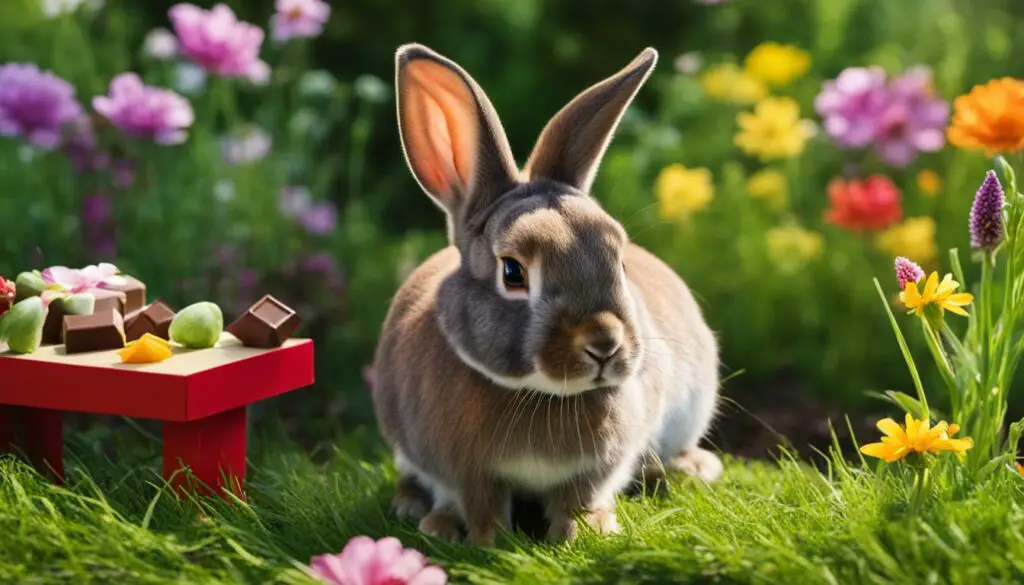Greetings, fellow pet owners! Today, I want to address a topic that’s crucial for the well-being of our furry friends: Can rabbits eat chocolate? As a responsible rabbit owner, it’s essential to be aware of the diet restrictions and harmful effects of chocolate on rabbits. Let’s dive in and explore why chocolate is a big no-no for our beloved bunnies.
Chocolate, as delicious as it may be for us humans, contains two harmful chemicals that can have detrimental effects on rabbits: caffeine and theobromine. These chemicals can stimulate a rabbit’s nervous system, leading to dehydration, increased heart rate, seizures, and even respiratory failure. It’s important to understand that chocolate is toxic to rabbits, and even small amounts can be fatal, especially in darker chocolate varieties with higher theobromine content.
As responsible pet owners, we must take proactive steps to prevent our rabbits from accessing chocolate and educate ourselves on safe foods for our fluffy companions. In this article, I will provide you with valuable information on why rabbits can’t eat chocolate, the dangerous consequences of chocolate ingestion, and what you should do if your rabbit accidentally consumes chocolate. Stick around for tips on rabbit-friendly treats as healthy alternatives to chocolate.
Remember, the well-being of our rabbits relies on us! Let’s keep them safe by avoiding foods that can harm them. Read on to learn more about the hazards of chocolate and how to protect our beloved bunnies.
Key Takeaways:
- Rabbits should not eat chocolate as it contains harmful chemicals like caffeine and theobromine.
- Chocolate can lead to severe health issues in rabbits, such as dehydration, increased heart rate, seizures, and respiratory failure.
- Even small amounts of chocolate can be fatal to rabbits, especially dark chocolate with higher theobromine content.
- If your rabbit ingests chocolate, it is essential to treat it as a medical emergency and seek immediate veterinary attention.
- Instead of chocolate, provide your rabbit with safe and healthy alternatives like small pieces of fruit or vegetables as treats.
Why Can’t Rabbits Eat Chocolate?
Rabbits have a unique digestive system that is not designed to process chocolate. Their natural diet consists of grasses, leaves, and hay, making them herbivores. Chocolate contains two harmful chemicals, theobromine, and caffeine, which can have severe effects on rabbits’ health.
| Theobromine | Caffeine |
|---|---|
| Stimulates the nervous system | Increases heart rate |
| Causes dehydration | May lead to seizures |
| Can result in respiratory failure |
These substances are toxic to rabbits, and even small amounts of chocolate can be fatal, especially in darker chocolate with higher theobromine content. Theobromine and caffeine can lead to increased heart rate, dehydration, seizures, and cardiac arrhythmias in rabbits. Their digestive systems are not adapted to process these chemicals, making chocolate a dangerous food for them.
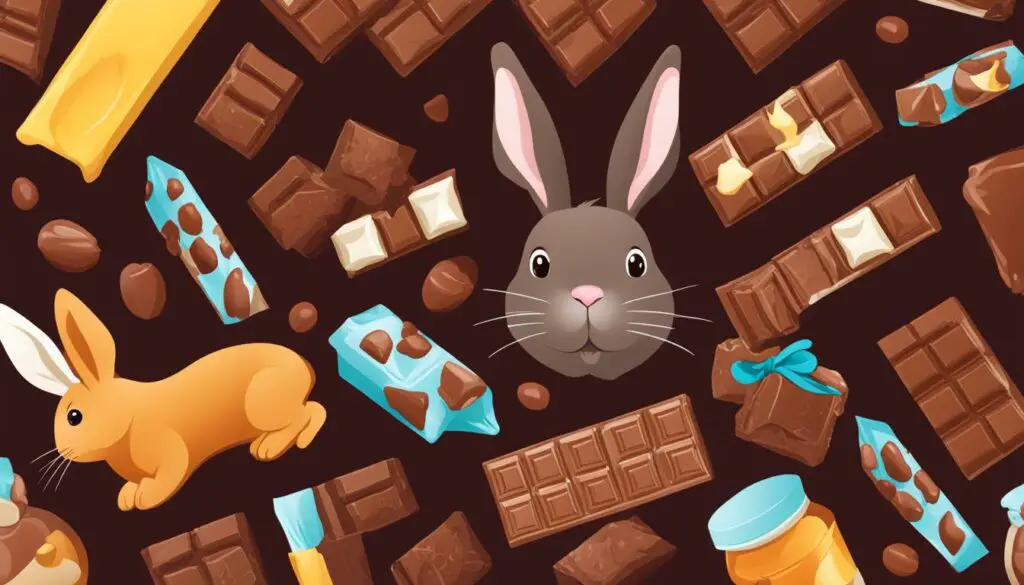
It is important for pet owners to be aware of the risks and to prevent their rabbits from accessing chocolate. Instead, rabbits should be provided with a diet that consists of hay, vegetables, and rabbit-friendly treats to ensure their well-being.
What Happens if a Rabbit Eats Chocolate?
When a rabbit ingests chocolate, it can have severe and potentially life-threatening consequences. Chocolate contains theobromine and caffeine, both of which are toxic to rabbits. These chemicals can lead to various symptoms of chocolate poisoning within 6-12 hours of ingestion.
The symptoms of chocolate poisoning in rabbits can include vomiting, diarrhea, hyperactivity, irregular heartbeat, muscle tremors, and even respiratory failure. It is important to note that even small amounts of chocolate can be harmful, especially dark chocolate with a higher theobromine content. Ingesting chocolate can quickly become a medical emergency for rabbits, so it is crucial to seek immediate veterinary attention if you suspect your rabbit has consumed any chocolate.
A veterinarian should be contacted for guidance on how to proceed. They may recommend bringing your rabbit in for treatment, as prompt action can increase the chances of a successful recovery. It is essential to remember that prevention is key – keeping all forms of chocolate away from rabbits is the best way to protect their health and well-being.
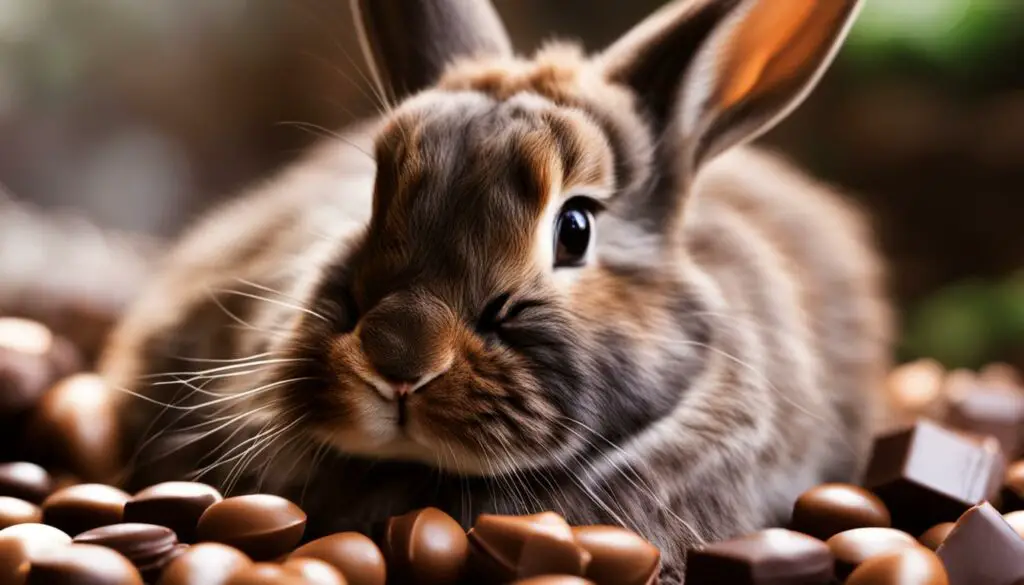
| Common Symptoms of Chocolate Poisoning in Rabbits |
|---|
| Vomiting |
| Diarrhea |
| Hyperactivity |
| Irregular heartbeat |
| Muscle tremors |
| Respiratory failure |
How Much Chocolate is Dangerous for Rabbits?
When it comes to chocolate and rabbits, it’s important to understand that even a small amount of chocolate can be extremely dangerous for these furry creatures. The toxic dose of chocolate for rabbits depends on their weight. As a general guideline, less than 1 oz of milk chocolate can be fatal for a 6-pound rabbit. However, it’s essential to note that theobromine and caffeine content varies in different types of chocolate.
In particular, dark chocolate contains higher levels of theobromine and caffeine, making it even more hazardous for rabbits. Theobromine is a stimulant that affects a rabbit’s nervous system, while caffeine can lead to increased heart rate and other complications. Therefore, it is crucial to keep all forms of chocolate away from rabbits to avoid any risk of toxicity.
Table:
| Type of Chocolate | Theobromine Content (mg/oz) | Fatal Amount for a 6-pound Rabbit (oz) |
|---|---|---|
| Milk Chocolate | 44-58 | Less than 1 |
| Dark Chocolate | 450-750 | Less than 1 |
As shown in the table above, both milk chocolate and dark chocolate contain theobromine, with dark chocolate having a significantly higher concentration. It is crucial to be aware of these numbers and ensure that rabbits are kept away from any chocolate products to protect their well-being.
Remember, the ingestion of any amount of chocolate can have serious consequences for rabbits. If you suspect that your rabbit has consumed chocolate or is exhibiting any symptoms of chocolate poisoning, it is imperative to seek immediate veterinary care. Time is of the essence, and prompt action can greatly increase the chances of a positive outcome for your beloved pet.
What to Do if Your Rabbit Eats Chocolate?
If you catch your rabbit eating chocolate or suspect that it has ingested any, it is crucial to take immediate action. Do not wait for symptoms to appear before seeking veterinary care. Contact your veterinarian for guidance on how to proceed, as they may recommend bringing your rabbit in for treatment. It is essential to act quickly to minimize the potential harm caused by chocolate ingestion.
“If your rabbit has gotten into chocolate, it is important to reach out to your veterinarian right away,” says Dr. Emily Smith, a rabbit specialist. “Theobromine, a chemical found in chocolate, is toxic to rabbits and can lead to serious health complications. Your veterinarian will be able to provide the necessary medical intervention and support to help your rabbit recover.”
In the meantime, you can help your rabbit by removing any remaining chocolate and monitoring its behavior closely. Look out for symptoms such as vomiting, diarrhea, hyperactivity, muscle tremors, and irregular heartbeat. Provide fresh water for your rabbit to prevent dehydration.
Remember, chocolate ingestion is considered a medical emergency for rabbits. Prompt veterinary care is crucial to increase the chances of your rabbit’s recovery. Do not hesitate to reach out to your veterinarian for immediate assistance.
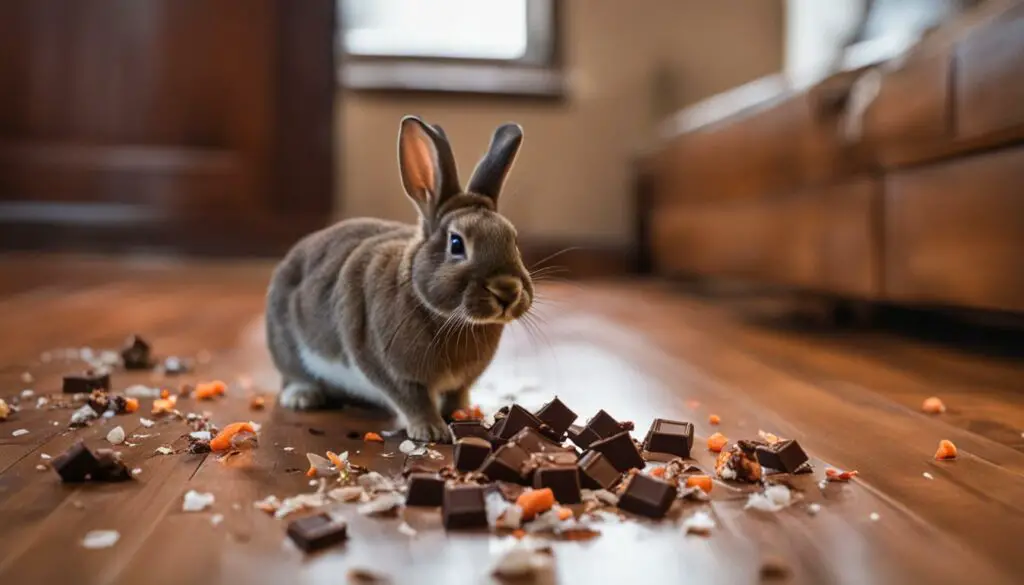
Tips to Prevent Chocolate Ingestion:
- Keep all forms of chocolate securely stored in a location inaccessible to your rabbit.
- Avoid feeding your rabbit any chocolate or foods that contain chocolate as an ingredient.
- Inform everyone in your household about the potential risks of chocolate for rabbits.
- If you have multiple pets, ensure that chocolate is not accessible to any of them, as it can be harmful to other animals as well.
By following these preventive measures and taking immediate action in case of chocolate ingestion, you can help keep your rabbit safe and healthy.
| Chocolate Type | Theobromine Content (per 1 oz) | Risk Level for Rabbits |
|---|---|---|
| Milk Chocolate | 44-64 mg | High |
| Semi-Sweet Chocolate | 135-138 mg | Very High |
| Baking Chocolate | 393-450 mg | Extremely High |
Table: Theobromine content and risk levels of different chocolate types for rabbits. All types of chocolate are toxic to rabbits due to the presence of theobromine.
Alternatives to Chocolate for Bunnies
If you’re looking for safe and healthy treats for your bunny, there are plenty of alternatives to chocolate that you can offer. These treats not only provide a variety of flavors and textures for your rabbit to enjoy but also ensure their well-being. Here are some rabbit-friendly options:
Fruit:
Small pieces of fruit can make a tasty and nutritious treat for your bunny. Some suitable fruits include bananas, apples (without seeds and core), and carrots. Fruit should be offered in moderation as a treat, as it can be high in sugar. Remember to remove any seeds, cores, or pits before giving them to your rabbit.
Vegetables:
Many vegetables can be a great alternative to chocolate for rabbits. Some suitable options include leafy greens like kale, spinach, and lettuce, as well as bell peppers, zucchini, and broccoli. These vegetables provide essential vitamins and minerals while adding variety to your rabbit’s diet. Again, it’s important to offer vegetables in moderation and avoid feeding too much at once.
Rabbit-Specific Treats:
There are also specially formulated treats available that are specifically designed for rabbits. These treats are typically made with natural and safe ingredients that cater to your rabbit’s dietary needs. Look for treats that are free from artificial colors, flavors, and preservatives. It’s always a good idea to check with your veterinarian for recommendations on rabbit-friendly treats.
| Treat | Description |
|---|---|
| Bananas | A sweet and nutritious treat that rabbits love. Make sure to offer it in small pieces. |
| Apples (without seeds and core) | Apple slices can be a crunchy and refreshing treat for your bunny. Avoid the seeds and core, as they contain cyanide. |
| Carrots | Carrots are a classic favorite for rabbits. They are crunchy and packed with vitamins. |
| Kale | Kale is a nutritious leafy green that can provide a variety of essential vitamins and minerals for your rabbit. |
| Bell Peppers | Bell peppers are a colorful and crunchy treat that rabbits enjoy. They are a great source of vitamin C. |
Remember, treats should only make up a small portion of your rabbit’s diet. The main component of their diet should always be high-quality hay, supplemented with fresh vegetables and a small amount of pellets. By offering safe and healthy alternatives to chocolate, you can ensure the well-being of your bunny and provide them with a variety of flavors to enjoy.
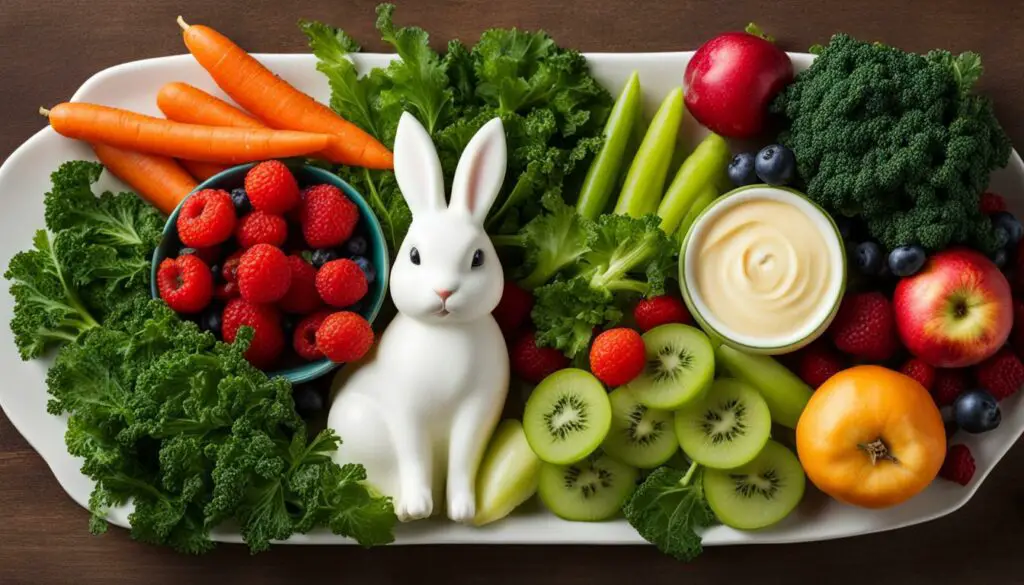
Why Do Rabbits Like Chocolate?
As a rabbit owner, you may wonder why rabbits are drawn to chocolate despite its harmful effects. The truth is, rabbits lack the ability to differentiate between safe and harmful foods. They rely on their owners to provide them with a proper diet and protect them from potential hazards, including chocolate. So, when presented with a piece of chocolate, rabbits will instinctively eat it, unaware of the risks it poses to their health.
Rabbits are not picky eaters and are driven by their instinctual behaviors. In the wild, they would consume a variety of plants and vegetation to meet their nutritional needs. Chocolate, however, is not a natural food for rabbits and can lead to serious health complications. The theobromine and caffeine present in chocolate can cause a range of problems, including increased heart rate, dehydration, seizures, and irregular heartbeat. These effects can be extremely dangerous for a rabbit’s well-being.
It is our responsibility as pet owners to ensure the safety and health of our rabbits. This means keeping chocolate away from them at all times and providing them with a proper diet consisting of hay, vegetables, and rabbit-friendly treats. By offering our rabbits a diet that meets their nutritional needs, we can help them live long and healthy lives.
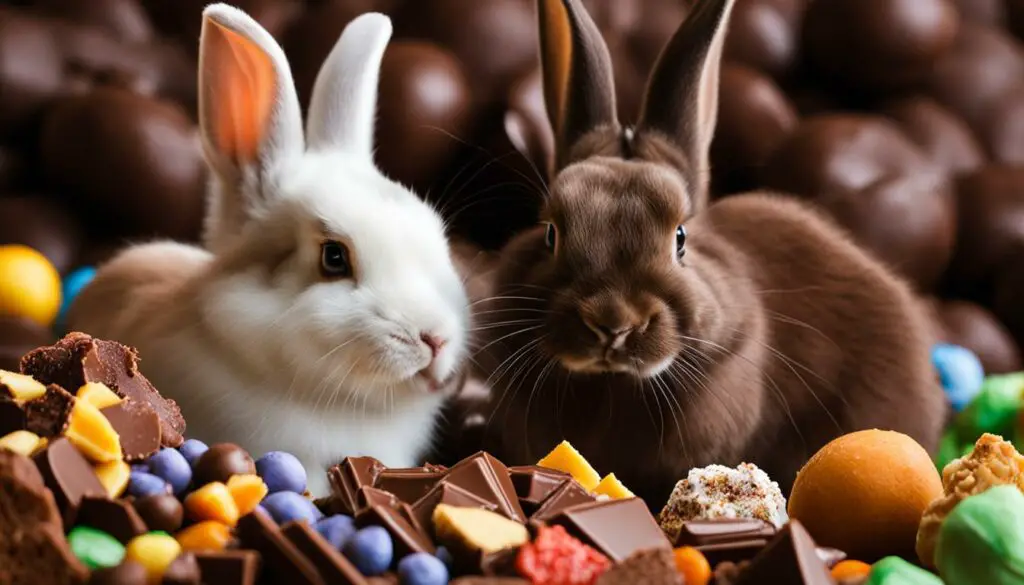
Rabbit Eating Behavior
Rabbits have a natural inclination to explore and taste different foods. Their inquisitive nature, coupled with their constant need to chew, can make them susceptible to ingesting harmful substances. This is why it is crucial to create a safe environment for your rabbit and ensure that you only offer them foods that are suitable for their digestive system.
“Rabbits are opportunistic eaters and will consume whatever is available to them. This is why it’s important to be vigilant and prevent them from accessing chocolate, as it can have severe consequences on their health.” – Dr. Petrick, veterinarian
By understanding their natural eating behavior and providing them with a proper diet, we can help rabbits thrive and keep them safe from potential hazards, such as chocolate. Remember, always consult with a veterinarian for specific dietary recommendations for your rabbit to ensure their optimal well-being.
Why is Chocolate Bad for Rabbits?
When it comes to rabbits, chocolate is more than just a sweet treat to be enjoyed. In fact, it can have serious health consequences for our furry friends. Theobromine and caffeine, two chemicals found in chocolate, can have detrimental effects on the delicate digestive system of rabbits. These substances can lead to dehydration, increased heart rate, seizures, irregular heartbeat, and other complications.
Unlike humans, rabbits have a unique digestive system that is not designed to process chocolate. Their natural diet consists of grasses, leaves, and hay, making them herbivores. As a result, their bodies are not equipped to handle the theobromine and caffeine found in chocolate. These chemicals can wreak havoc on their sensitive digestive systems, causing a wide range of health issues.
To truly understand why chocolate is bad for rabbits, it’s important to delve into the specifics of their digestive system. Rabbits have a simple stomach and a relatively short digestive tract. They rely on the fermentation of fiber-rich foods to extract nutrients and maintain a healthy balance of gut bacteria. Chocolate, with its high sugar, fat, and caffeine content, disrupts this delicate balance and can lead to digestive upset and even more severe complications.
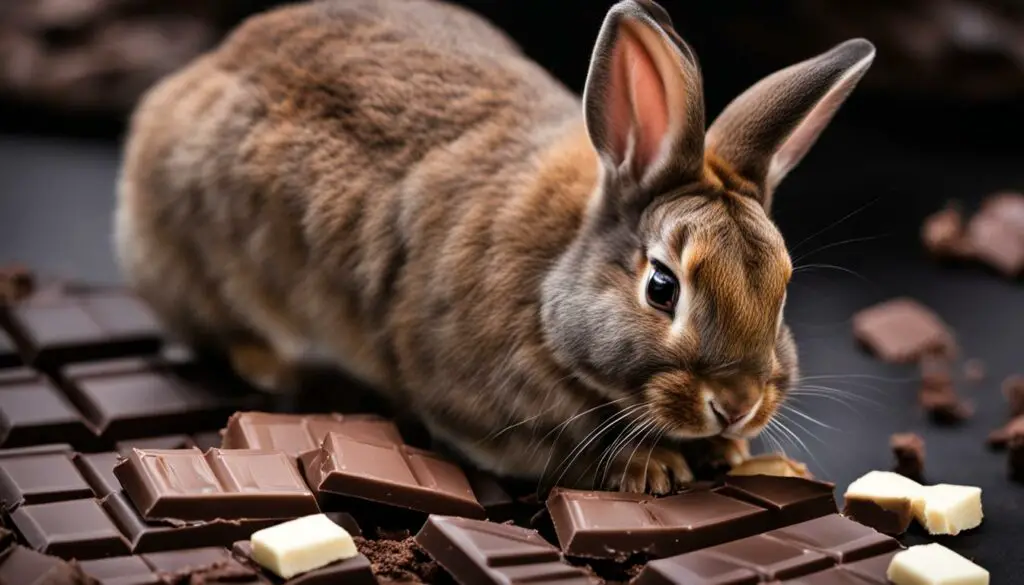
So, as tempting as it may be to share a piece of chocolate with your furry friend, it’s best to avoid it altogether. By sticking to a diet that consists of hay, fresh vegetables, and rabbit-friendly treats, you can ensure that your rabbit stays happy and healthy. Remember, when it comes to chocolate and rabbits, it’s always better to be safe than sorry.
Table: Chocolate Toxicity in Rabbits
| Weight of the Rabbit | Amount of Chocolate | Potential Health Risks |
|---|---|---|
| 6 pounds | Less than 1 oz of milk chocolate | Potentially fatal |
| 6 pounds | Less than 0.5 oz of dark chocolate | Higher risk of toxicity due to increased theobromine content |
| Varies | Any amount of white chocolate | Can still cause digestive issues due to high sugar and milk content |
Can Bunnies Eat White Chocolate?
When it comes to rabbits and chocolate, it’s vital to understand that all types of chocolate, including white chocolate, are not safe for bunnies. While white chocolate contains lower levels of theobromine compared to darker chocolate, it can still pose risks to a rabbit’s health. The theobromine content in white chocolate may be lower, but the high sugar and milk content can still cause digestive problems in rabbits.
Rabbits have delicate digestive systems that are not designed to process the ingredients found in chocolate. The theobromine and caffeine present in chocolate can lead to dehydration, increased heart rate, seizures, and other serious complications. It’s important to prioritize their well-being by avoiding all forms of chocolate, including white chocolate, in their diet.
Instead of offering white chocolate, there are plenty of safe and healthy alternatives for rabbits to enjoy as treats. Fruits such as bananas, apples (seedless and without the core), and carrots can be given to rabbits in small pieces as occasional treats. However, it’s crucial to remember that these treats should only make up a small portion of their diet, with hay being the primary component.
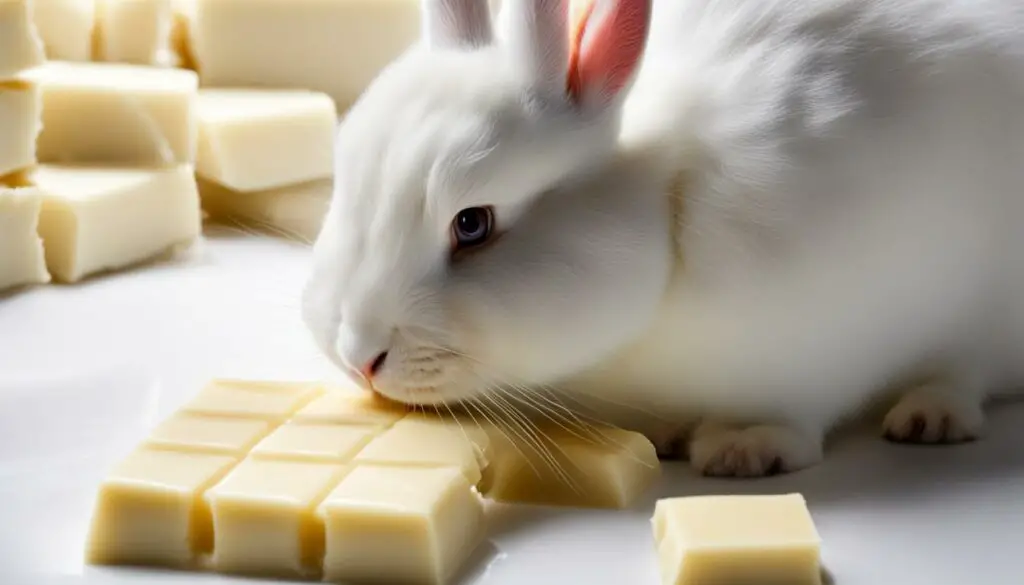
Table: Theobromine Content in Different Types of Chocolate
| Chocolate Type | Theobromine Content (per 100g) |
|---|---|
| Dark Chocolate | 450mg |
| Milk Chocolate | 60mg |
| White Chocolate | 0mg |
As shown in the table, white chocolate contains zero theobromine, but it is still not suitable for rabbits due to its high sugar and milk content. It’s always best to prioritize the health and well-being of your furry friend by offering them a diet that aligns with their natural needs.
Conclusion
In conclusion, it is crucial to remember that rabbits cannot eat chocolate due to the harmful effects of caffeine and theobromine. Chocolate can be toxic to rabbits and lead to severe health complications. It is best to provide rabbits with a diet that consists of hay, vegetables, and rabbit-friendly treats, avoiding any form of chocolate. Always consult with a veterinarian for specific dietary recommendations for your rabbit.
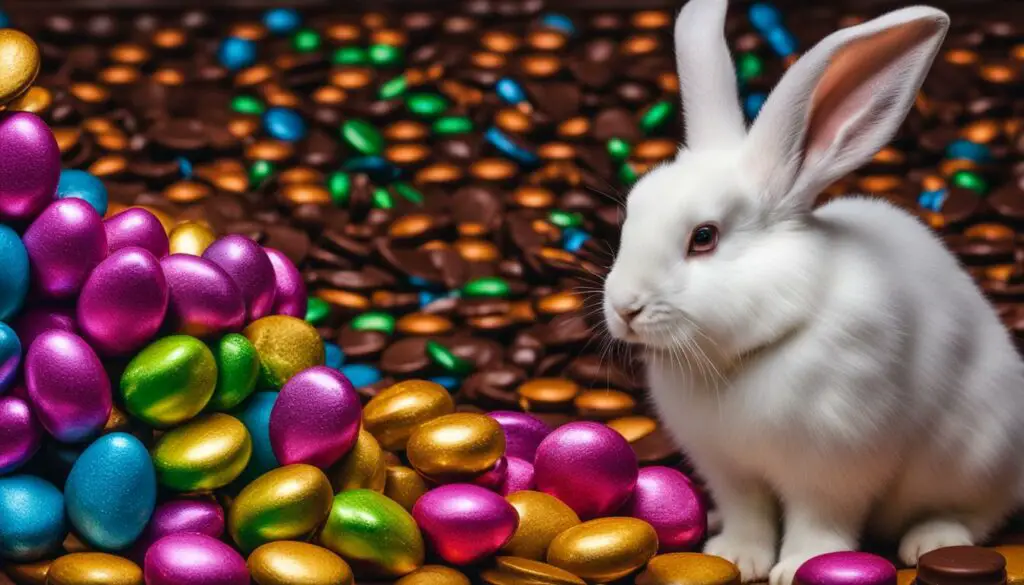
Rabbit Health Risks
When it comes to rabbits, their health should always be the top priority. Feeding them chocolate can put their well-being at risk. Theobromine and caffeine found in chocolate can lead to a range of health issues, including increased heart rate, dehydration, seizures, irregular heartbeat, and other serious complications. It is important to understand the potential risks involved and take necessary precautions to keep rabbits safe from chocolate consumption.
Rabbit-Friendly Treats
While chocolate is off-limits for rabbits, there are plenty of safe and delicious alternatives that can be offered as treats. Small pieces of fruit such as bananas, apples (without seeds and core), and carrots can be healthy and enjoyable options. However, it is important to remember that treats should be given in moderation and should not replace the main components of a rabbit’s diet, such as hay. Always consult with a vet to ensure you are providing the right treats for your rabbit’s specific needs.
References and Further Reading
For more information about chocolate toxicity in animals and rabbit diet information, consider the following resources:
- MSD Manual, Veterinary Manual – A comprehensive guide to veterinary medicine, including information on chocolate toxicity in various animals.
- ASPCA – The American Society for the Prevention of Cruelty to Animals offers valuable resources on animal health and emergency care, including guidelines on how to treat chocolate ingestion in rabbits.
- USDA Food Composition Database – A database that provides detailed information about the nutritional composition of various foods, including dark chocolate and milk chocolate.
- Binky Bunny – A website dedicated to rabbit care and education, offering helpful articles on various topics, including what to do if your rabbit ate chocolate.
- be.chewy.com – A reliable source for pet information, including an article on rabbits and chocolate ingestion.
- wereallaboutpets.com – A website that provides comprehensive information on various pets, including an article on whether rabbits can eat chocolate.
“Chocolate Toxicity.” Gwaltney-Brant, S. M., DVM, PhD, DABVT, DABT, University of Illinois
Summary
In conclusion, it is essential to educate ourselves about the potential risks and dangers that certain foods like chocolate pose to our beloved pets. Rabbits should never be fed chocolate due to its toxicity, which can cause severe health issues, including dehydration, seizures, and irregular heartbeat. As responsible pet owners, it is our duty to prioritize the well-being of our rabbits by providing them with a diet that consists of safe and suitable foods.
For further reading and information, the listed resources provide valuable insights into chocolate toxicity in animals, specific advice on rabbit diet restrictions, and useful guidelines on maintaining the health and happiness of our furry friends.
| Resource | Description |
|---|---|
| MSD Manual, Veterinary Manual | A comprehensive guide to veterinary medicine, including information on chocolate toxicity in various animals. |
| ASPCA | The American Society for the Prevention of Cruelty to Animals offers valuable resources on animal health and emergency care, including guidelines on how to treat chocolate ingestion in rabbits. |
| USDA Food Composition Database | A database that provides detailed information about the nutritional composition of various foods, including dark chocolate and milk chocolate. |
| Binky Bunny | A website dedicated to rabbit care and education, offering helpful articles on various topics, including what to do if your rabbit ate chocolate. |
| be.chewy.com | A reliable source for pet information, including an article on rabbits and chocolate ingestion. |
| wereallaboutpets.com | A website that provides comprehensive information on various pets, including an article on whether rabbits can eat chocolate. |
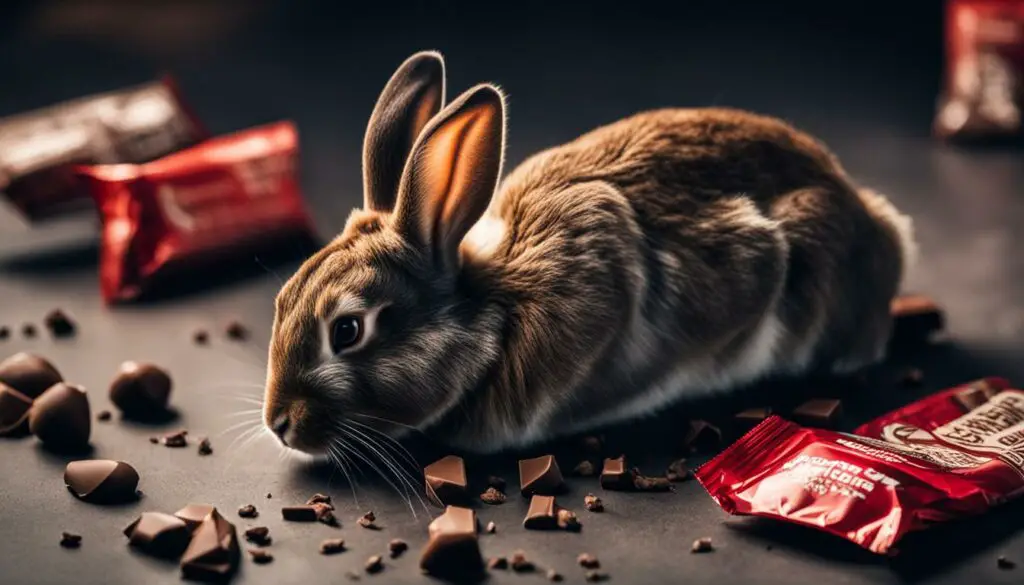
Rabbits and Chocolate: Understanding the Harmful Effects
As a responsible pet owner, it is essential to be aware of the potential dangers that chocolate can pose to your beloved rabbits. While chocolate may be a delectable treat for humans, it can have severe harmful effects on rabbits due to its toxic components. Understanding these risks can help you protect your furry friends and ensure their well-being.
One of the main reasons why chocolate is harmful to rabbits is its caffeine and theobromine content. These substances, which are found in varying quantities depending on the type of chocolate, can adversely affect a rabbit’s health. When rabbits ingest chocolate, caffeine and theobromine can stimulate their nervous system, leading to potentially life-threatening symptoms such as increased heart rate, dehydration, seizures, and respiratory failure.
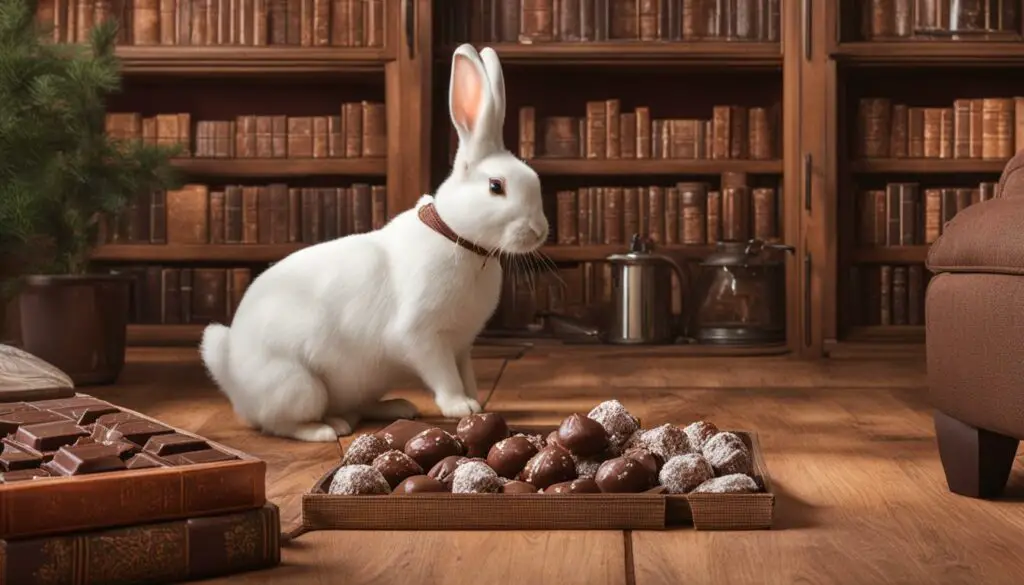
The Harmful Effects of Chocolate on Rabbits
When rabbits consume chocolate, the toxic components are quickly absorbed into their system and can cause a range of detrimental effects. These include:
- Cardiac issues: Chocolate ingestion can lead to an irregular heartbeat and cardiac arrhythmias in rabbits, posing a significant risk to their overall cardiovascular health.
- Seizures: Theobromine and caffeine can trigger seizures in rabbits, causing distress and potentially leading to further health complications.
- Gastrointestinal problems: Chocolate can disrupt the delicate balance of a rabbit’s digestive system, leading to gastrointestinal issues such as vomiting and diarrhea.
To ensure the well-being of your rabbits, it is crucial to avoid feeding them any form of chocolate. Instead, opt for safe alternatives such as small pieces of fruit (e.g., bananas, apples without seeds and core) or carrots as occasional treats. By providing a balanced and rabbit-friendly diet, you can help keep your furry companions healthy and happy.
| Harmful Effects of Chocolate on Rabbits |
|---|
| Cardiac issues |
| Seizures |
| Gastrointestinal problems |
Conclusion
In conclusion, it is important to prioritize the well-being of our rabbits by understanding the risks associated with chocolate consumption. Rabbits should never eat chocolate as it poses significant health risks, including cardiac issues, seizures, and digestive complications. Theobromine and caffeine, present in chocolate, can be toxic to rabbits and cause severe harm.
As responsible pet owners, we must provide our rabbits with a safe and healthy diet that consists of hay, vegetables, and rabbit-friendly treats. It is crucial to avoid offering any form of chocolate to rabbits, including white chocolate, as even small amounts can have detrimental effects. Consult with a veterinarian for specific dietary recommendations tailored to your rabbit’s needs.
Remember, by being mindful of what we feed our rabbits and prioritizing their health, we can ensure their well-being and provide them with a long and happy life. Let’s keep our furry friends safe and enjoy the joy they bring to our lives with suitable treats and a diet that supports their natural needs.
FAQ
Can rabbits eat chocolate?
No, rabbits cannot eat chocolate. Chocolate contains harmful chemicals such as caffeine and theobromine, which are toxic to rabbits and can have severe health effects.
Why can’t rabbits eat chocolate?
Rabbits have a unique digestive system that is not designed to process chocolate. The theobromine and caffeine in chocolate can lead to dehydration, increased heart rate, seizures, and other complications in rabbits.
What happens if a rabbit eats chocolate?
If a rabbit eats chocolate, it can experience symptoms of chocolate poisoning within 6-12 hours. These symptoms may include vomiting, diarrhea, hyperactivity, irregular heartbeat, muscle tremors, and even respiratory failure.
How much chocolate is dangerous for rabbits?
The amount of chocolate that can be dangerous for a rabbit depends on its weight. Even a small amount of chocolate, especially dark chocolate with higher theobromine content, can be fatal to rabbits.
What should I do if my rabbit eats chocolate?
If you catch your rabbit eating chocolate or suspect ingestion, it is crucial to take immediate action. Contact your veterinarian for guidance and seek immediate veterinary care. Do not wait for symptoms to appear.
What are the alternatives to chocolate for rabbits?
Instead of chocolate, there are plenty of safe and healthy alternatives for rabbits, such as small pieces of fruit like bananas, apples (without seeds and core), and carrots. These treats should be offered in moderation.
Why do rabbits like chocolate?
Rabbits do not have the ability to discern what is safe or harmful for them to eat. They will eat whatever is presented to them, including chocolate. It is our responsibility as pet owners to protect them from potentially harmful foods.
Why is chocolate bad for rabbits?
Chocolate is bad for rabbits because their digestive systems are not adapted to process the chemicals present in chocolate, such as caffeine and theobromine. These chemicals can lead to severe health issues in rabbits.
Can bunnies eat white chocolate?
No, bunnies cannot eat white chocolate either. While it may have lower levels of theobromine, the high sugar and milk content in white chocolate can still cause digestive issues for rabbits.
Where can I find more information about rabbits and chocolate?
For more information about rabbits and chocolate, you can refer to reputable sources such as the MSD Manual, Veterinary Manual, ASPCAPRO, Binky Bunny, and wereallaboutpets.com. Always consult with a veterinarian for specific dietary recommendations for your rabbit.
Can rabbits eat other types of chocolate, like milk chocolate?
No, rabbits should not eat any type of chocolate, including milk chocolate. Chocolate is toxic to rabbits and can have serious health effects. It is best to avoid all forms of chocolate for the well-being of your rabbit.

